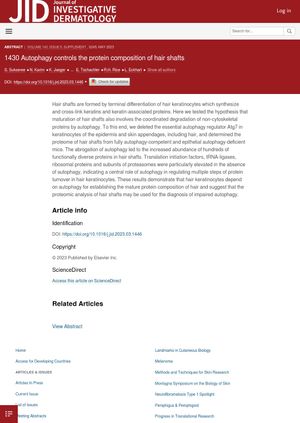Autophagy Controls the Protein Composition of Hair Shafts
April 2023
in “
Journal of Investigative Dermatology
”

TLDR Autophagy is important for determining the protein makeup of hair.
The study "1430 Autophagy controls the protein composition of hair shafts" conducted by S. Sukseree from the Department of Dermatology, Medical University of Vienna, tested the hypothesis that the maturation of hair shafts involves the coordinated degradation of non-cytoskeletal proteins by autophagy. The researchers deleted the essential autophagy regulator Atg7 in keratinocytes of the epidermis and skin appendages, including hair, and analyzed the proteome of hair shafts from fully autophagy-competent and epithelial autophagy-deficient mice. The results showed that the absence of autophagy led to an increased abundance of hundreds of diverse proteins in hair shafts, particularly translation initiation factors, tRNA-ligases, ribosomal proteins, and proteasome subunits. This indicates that autophagy plays a central role in regulating multiple steps of protein turnover in hair keratinocytes. The study suggests that hair keratinocytes depend on autophagy for establishing the mature protein composition of hair and that proteomic analysis of hair shafts could be used for diagnosing impaired autophagy.